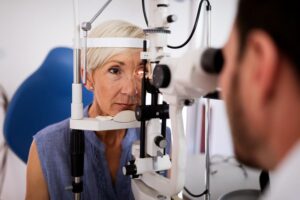
Throughout the United States, millions of people struggle with vision impairment. For some of those individuals, their condition is due to cataracts, accidents, or other sad circumstances. For many, though, the main cause of their vision problems is diabetic retinopathy. Certainly, if you have been diagnosed with diabetes, you should make every effort to protect your eye health! How can you do that? For one thing, you should make sure you get enough high-quality sleep. This blog post discusses the fascinating connection between sleep apnea and blindness.
Sleep Apnea and Diabetic Retinopathy
The retina is the part of the eye that responds to light. Retinopathy affects this important structure. It occurs when blood vessels in the retina become damaged. Over time, retinopathy can lead to another condition, known as macular edema, which is a buildup of fluid within the retina. Edema often causes significant damage to vital tissues within the eye, leading to blindness or severe vision impairment. Sadly, retinopathy is common among individuals with uncontrolled diabetes.
There is a strong correlation between sleep apnea, diabetic retinopathy, and macular edema. In one study, it was even found that the occurrence of severe sleep apnea was twice as high in individuals with macular edema (compared to individuals with healthy eyes).
How Does Sleep Apnea Cause Vision Problems?
Sleep apnea is a disorder that is characterized by multiple pauses in breathing during sleep. While there is no evidence to suggest that it is directly responsible for vision problems in diabetics, it may indirectly contribute to such issues.
For example, sleep apnea can be a major risk factor for high blood pressure, which can damage the delicate blood vessels in the eyes. Sleep apnea can also interfere with various hormones, including insulin, as well as hormones that control hunger and satiety. In turn, this can make it more difficult for diabetics to keep their condition under control.
What You Can Do
If you have been diagnosed with diabetes, and you are concerned about the quality of your sleep, there may be a few steps you can take to protect your eye health:
- Talk to your medical team about undergoing a sleep test so you can find out for sure if you have sleep apnea.
- Consistently use your sleep apnea treatment. Many patients find success with a custom oral appliance from a dentist.
- Manage your diabetes. In addition to getting enough high-quality sleep, you should also pay attention to your eating and exercise habits.
- Visit an optometrist or ophthalmologist for routine eye exams.
Sleep apnea can do more than make you tired; it might endanger your vision! Work with your care team to protect your precious eyes.
Meet the Practice
At Fort Worth Snoring and Sleep Center, we are proud to work under the guidance of Dr. Mitch Conditt, an experienced sleep dentist. He has in-depth knowledge of how sleep apnea can affect the body, and he provides customized treatment options to help patients achieve better rest. To learn more about how he and our team may be able to serve you, contact our office at 817-527-8500.
